The ‘Underworld Saga’ was a rollercoaster of emotions
Jorge Rivera-Herrans finally released the continuation of “Epic: the Musical” last Friday, Apr 26. The three-song saga is marked by the tracks: “The Underworld,” “No Longer You,” and “Monster,” all of which are incredible additions to the mix and work perfectly as the finalization of Act One.
The “Underworld Saga,” condenses many of the events from the previous four segments of the musical and their consequences, leading Odysseus to a reevaluation of philosophies that will change the journey of the remainder of his crew. An addition of authentic tunes and sudden emotional responses from the public further proves Herrans’s sharp skills as a lyricist and composer.

“The Horse and the Infant” is the very first song of the concept album and lives up to these expectations. With a mix of some spoken rhythm elements, changing tempo, and electronic elements, all with their specific purpose. As stated by Jorge Riverra-Herrans, the playwright and creator of “Epic,” this first melody had to establish four main points: what kind of a play “Epic” is, the musical language of the show, and how it applies to each character, and the themes that might be explored throughout the musical. At the start of the song, the audience is introduced to orchestral themes and a constant increase in the tempo of the song, representing the mortality of all characters seen as they prepare to charge from inside to the Trojan horse. However, not only mortals are represented in the opening number but Athena, Odysseus’ patron goddess and the deity of strategy and wits; and Zeus, king of the gods and thunder are also shown. First by the ticking of a clock and next by adding electronic elements that accompany all creatures with power in the musical.
“Find that inner strength now
Use that well of pride
Fought through every pain now
Ask yourself
What do you live for?
What do you try for?
What do you wish for?
What do you fight for?”
As Odysseus’ if faced by a test of his morals, he has to decide if he should sacrifice a young life or let him live at the cost of his own life and the lives of all people of Ithaca, people of his kingdom. The melodies are extremely raw during the start and have many stringed instruments, especially the guitar instrument that represents him. But in this moment, it is also a bridge between him and his family back home, where the viola represents his wife the viola and there are soft hymns in the melody, showing the audience his grieving heart that wants to return home.
“Will these actions haunt my days
Every man I’ve slain
Is the price I pay endless pain?
Close your eyes
And spare yourself the view
How could I hurt you?”
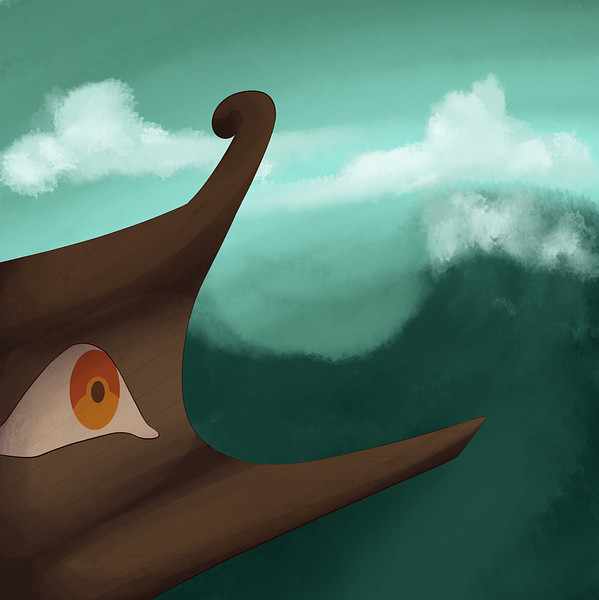
Marked by magnificent upbeat music after a devastating choice, “Full Speed Ahead” is the song that introduces three important side characters to the story Eurylochus, Odysseus’ second in command, Polites, the hero’s dearest friend, and the rest of his crew, whose musical moments always accompany Eurylochus. It also reveals the next step of their journey: finally returning home after ten years of war in a foreign land. Its incredible use of a chorus and the grasp of each of the actor’s tone of voice shows mastery in the manipulation of each person’s ability, and the simple details such as the sound of waves in the background add to the imagination of the audience.
“And Ithaca is waiting [Ithaca is waiting]
My kingdom is waiting [the kingdom is waiting]
Penelope’s waiting for me
So full speed ahead, full speed ahead”
Another very upbeat yet special song, “Open Arms”, shows the strong bond between Odysseus and Polites over a conversation about the importance of kindness and not taking precipitated actions. As Rivera-Herrans mentions, Polites is represented by the Kalimba and Marimba, both of which are very bright and cheerful, showing how the character “is the embodiment of light in the show,” reflecting his will to greet the world with empathy rather than aggression.
“This life is amazing when you greet it with open arms
I see in your face, there is so much guilt inside your heart
So why not replace it and light up the world
Here’s how to start:
Greet the world with open arms
Greet the world with open arms”
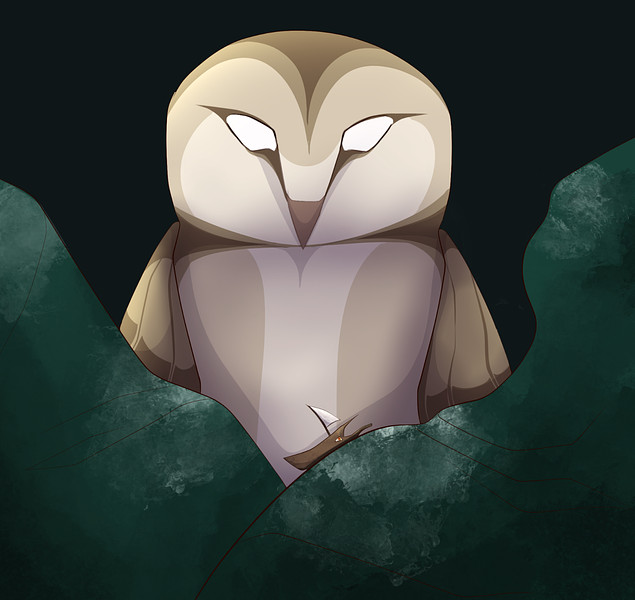
“Have you forgotten the lessons I taught you?” are the very words that begin “Warrior of the Mind,” introducing one of the most impactful characters of the story, Athena, and her status as Odyssus’ patron goddess, responsible for his mentoring in youth and guide as a grown hero. She uses her power, known as quick thought and represented by a clock motif, to have a conversation with Odysseys, and remind him how harsh actions are necessary to accomplish his objectives. The goddess’ accompanying instrument is the piano, one that requires great dexterity and ability to play, enforcing her status of representing battle tactics and intelligence.
I still intend to make sure you don’t fall behind
Don’t forget that you’re a warrior of a very special kind
You are a warrior of the mind
Don’t disappoint me”
Offering a complete change in tempo to the musical, “Polyphemus” reveals the first true enemy that he will faced: the cyclops Polyphemus. The perfect balance between music and silence is what makes this song truly unique. The overwhelming silence behind the voices of Odysseus and his crew transports the apprehension in the hearts of the characters right to the audience, making the revelation of the Cyclops incredibly uneasy. Another element that was well played was the use of each character’s instrument, specifically Odysseus and Polyphemus’, where the first is represented by the light strumming of a guitar until the revelation of the mythological beast, where all beats fall to low tunes. There is the introduction of the cello, heightening Rivera-Herrans’ intentions with the emotions imputed into the song.
“Before I’m done
You’ll learn that it’s not so fun to take
You came to my home to steal
But now you’ll become my meal
A trade, you see?
Take from you what you’ve took from me”
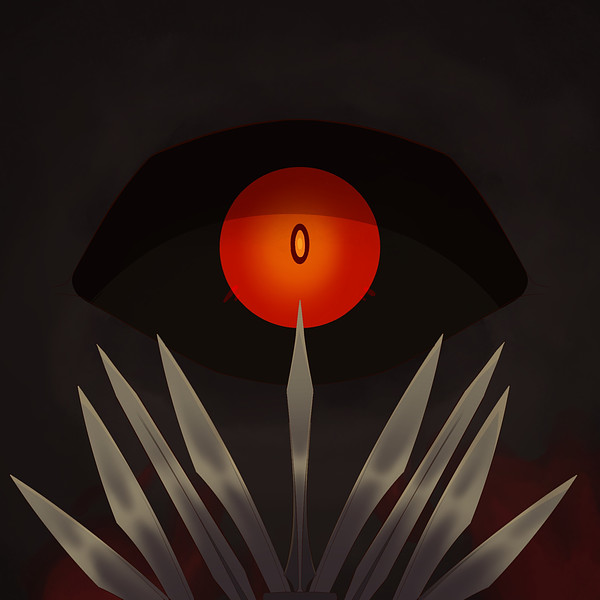
The battle erupts with a roar from Polyphemus, with a smooth transition from “Polyphemus” to “Survive,” the tempo starts to be raised rapidly, reflecting the rush of adrenaline that all of the crew received from the cyclops’ unexpected attack. Later on, the contrast between their fighting style reliant on speed while Polyphemus is a slow but powerful attacker. Complimenting sounds of battle and the unpredictable silence just add to the strength of the instrumental performance, making the sounds of despair as the Cyclops gain an edge to the battle increasingly menacing.
“Six hundred lives at stake
It’s just one life to take
And when we kill him then our journey’s over
No dying on me now
Defeat is not allowed
We must live through this day so
Fight, fight, fight”
“Remember them” represents the sorrow of Odysseus and his emotional response after the sudden loss of his crew members, especially Polites, in a surprise attack from the Cyclops. By using seeds of Lotus he acquired in “Open Arms”, he manages to collapse Polyphemus, and the hero decides to attack his most vulnerable spot, his one eye. However, he honors his late friend by sparing the Cyclops’ life instead of treating him with ruthlessness, a decision that dearly upset his patron goddess and incurred her wrath.
“Remember them
When the fire begins to fade
For the fallen and the afraid
We are not to let them die in vain
Remember them
We are the ones who carry on
The flames of those who have gone
And our comrades will not die in vain”
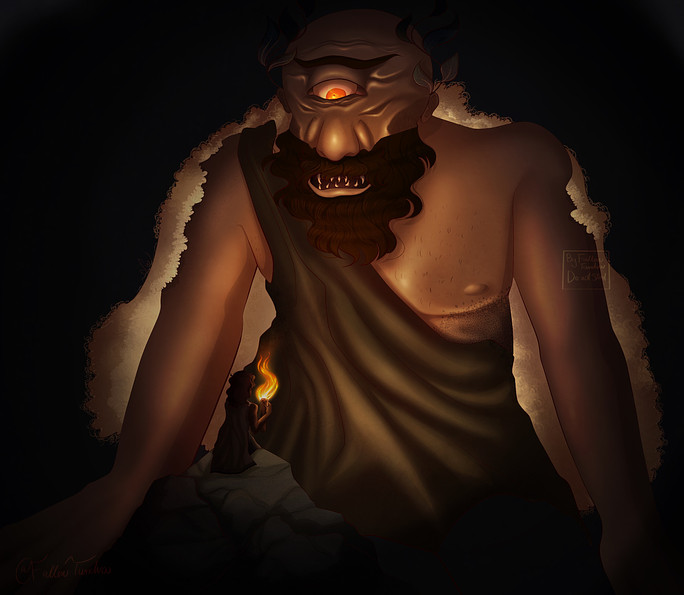
Despite the confrontation with the Cyclops finalizing, there is still one major conflict: Athena’s warning given in “Warrior of the Mind” not being heeded, and his disrespect towards the goddess. Athena does not take such disregard for her judgment lightly. As revealed in “My Goodbye”, Odysseus and the deity have a heated argument regarding their flaws and morals, a catchy collision of both of their instruments and melodies, accompanied by marching drums at the end of the song, a reference to their connections to the Trojan war. In the end, he loses her protection, a costly decision considering what is to come.
“One day, you’ll hear what I’m saying
One day, you might understand
One day, but not today, after all you are
Just a man”
A powerful storm hits Odysseus and his crew and a mixture of hope and fear washes over them as they fight against the forces of nature to finally arrive home. With some similarities to “Full Speed Ahead,” “Storm” implements many elements of the crew’s voices with higher and lower cadences to create beautiful melodies that give a similar impression to the sound of violent winds. There are also subtle additions of trumpets, a representative element of an antagonist that is not yet revealed, raising the question of whether the storm was truly natural or the feat of a god.
“These waves and tides
Have grown in strength and size
Or a blessing in disguise?
Our home’s in sight
This storm’s our final fight
There’s no time to die”

Upon reaching the safety of the island of the wind god, Aeolus, Eurylochous expresses his worry for the safety of all the men that they led, going to have a conversation with Odysseus to explain that all worried that their luck to be alive would soon run out. Six hundred men went to war from Ithaca, all survived, but only a few were lost to the Cyclops. They wondered if there was a great tragedy coming to decimate them. Despite their concerns, the captain remarks that he needs Eurylochus’s undying trust. Without the second-in-command’s trust, all others wouldn’t have the courage to keep going.
“Yes, but how much longer ’til your luck runs out?
How much longer ’til the show goes south?
How much longer ’til we all fall down?
You rely on wit, and people die on it”
“Keep your Friends Close” shows the progression of a week of events throughout the progression of the song. It reveals a small deal made by Odysseus and the deity to evade the storm. Aeolus, being in control of the winds, traps the spirits of the storm in a sack and gives it to the captain, challenging him to keep it close while his crew questions if he is telling the truth about the contents of the bag or if he is hiding treasure. There are many important instrumental aspects carefully managed in this section, such as the difference in the beat of the background voices and of the overall song, the revelation of Odysseus’ delirium for home, and the eventual opening of the bag.
“Keep your friends close and your enemies closer
Never really know who you can trust
If they wanna get the bag open, you gotta say, “No, sir”
Sometimes killing is a must
What?
‘Cause the end always justifies the means
Friends turn into foes and rivalries”
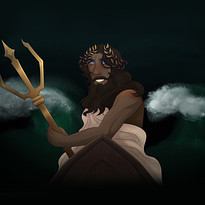
The reality of who caused the storm that was chasing Odysseus’ crew is finally revealed: Poseidon, God of the Sea, who is seeking revenge against the Greek Hero. His rage came as payback for two of the hero’s actions, blinding his Cyclops son and the lack of ruthlessness in his actions. The only reason God even came to set the balance right was because Polyphemus was alive after his attack, which would not have happened if Odysseus had the guts to be fierce. The price for his cowardice being the greatest of them all: the death of four hundred and fifty-seven out of six hundred in his crew. In this particular song, there are so many detailed elements that impress the feeling of danger, from the separation into triplets, giving that sense of rush, the addition of staccato strings (like done in Jaws when the sharks come by), and the blaring of trumpets, his main instrument.
“The line between naïveté and hopefulness is almost invisible
So close your heart, the world is dark and
Ruthlessness is mercy
Die”
“Puppeteer” reveals a complete shift from the chaos that Poseidon had brought. Using the last wind from Aeolus’ bag, the remainder of the crew lands on a fertile island called Aiaia, home to a powerful woman. When Rivera-Herrans says, “She’s a queen, she’s a goddess, she’s a witch, she’s a badass,” she uses her charming personality and persuasion to trick Odysseus’ men into drinking her enchanted wine, turning them all into pigs, the form she sees as the fittest considering all the harm they could have caused to her and her nymphs. Only Eurylochus escapes from her trap, warning the captain about the witch. Apart from Talya Sindel’s melodic voice used for Circe, there are also many electronic elements to represent her magic (with the Low-Frequency Oscillations) and the recurring strumming of strings to represent her regality.
For inside the meal │ think of your past
She had cast a spell │ and your mistakes
They began to squeal │ they’ll be the last
And grow snouts and tails │ mistakes you’ll make

As Odysseus heads to Circe’s abode, strategy brewing in his head for how he could defeat an all-powerful sorceress, a very helpful god offers his assistance. Hermes, the messenger of gods, offers him a new weapon, the flower moly, which gives the hero safe ground against Circe. In his music, Jorge Riverra-Herrans gave him a characteristic pairing that he calls “harps and arps”, the second word being a short version of arpeggios, lyres, and groovy melodies that can make any listener sway to the song along with the quick-footed god.
“Wouldn’t you like a taste of the power?
Wouldn’t you like to use more than words?
Deep in the night the fight lasts for hours
You can be hurt or you can beat her”
The hero and the goddess finally face each other. Their might to defend those reliant on them high as tension arises and Odysseus comes out victorious, but not for a long period, as Circe prepares to use her last resort. Accompanied by beats that remind the listener of the French Opera Carmen (Habanera), as both women use seduction when put in tighter situations; apart from this, as both characters have their intellectual conflict, the instruments and orchestra represent the conflict between their representative instruments, as Riverra-Herrans explains in one of his videos.
“If you makе one wrong move, then you’re done for
Anything I don’t approve, then you’re done for
I could put a spell on you and you’re done for
Boy, you better run or soon you will done for”
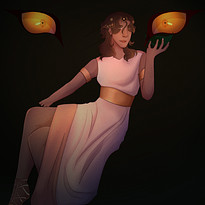
As powerful as Circe’s seduction is, Odysseus’ yearning for his wife and family becomes stronger, resisting the witch’s trick and convincing her to free himself and his men with the next step of their journey, a trip to the underworld to meet the prophet Tyreseas. This song is particularly intricate with its use of melodies from many other moments and characters of the musical. Penelope’s classical viola is played when he thinks of her, a nice touch to represent the character without the direct mention of their name, another relevant foreshadowing is the synth and sounds used when Circe mentions the underworld, which resemble a high level of detail the ones used in other snippets featuring this mythological place.
“There are other options of passion
You have so much left to learn
Want to save your men from the fire?
Show me that you’re willing to burn”
Circe followed through with her promise from “There Are Other Ways” and Odysseus entered the Underworld. What the hero and the listeners alike didn’t expect, however, was the emotional rollercoaster that this song would put them through. As the song progresses, all souls who were lost in his ship come back to haunt the hero, choruses of the ensemble calling to him and leading to his madness. Despite this, it does not last long, for Polites and his recently departed mother, Anticlea is reintroduced as lost souls in the fields of asphodel, souls who are repeating their last thoughts forever. These moments are chilling for the audience, as not only this moment of meeting is extremely melancholic, but Herrans’s use of melodies is simply extraordinary. The instruments that are at a high in the beginning calm down to reflect Polites’ and then the mother’s particular tunes, but they are also reverbed (which means an echoing pattern is used to create an almost delayed or slow repeating sound) in a way that sounds nostalgic, reflecting what Odysseus felt in this very moment.
All I hear are screams
Every time I dare to close my eyes
I no longer dream (I no longer dream)
Only nightmares of those who’ve died
Nothing’s what it seems
Nothing’s what it seems
But in the Underworld, your past is always close behind
Your past is always close behind
Down in the Underworld
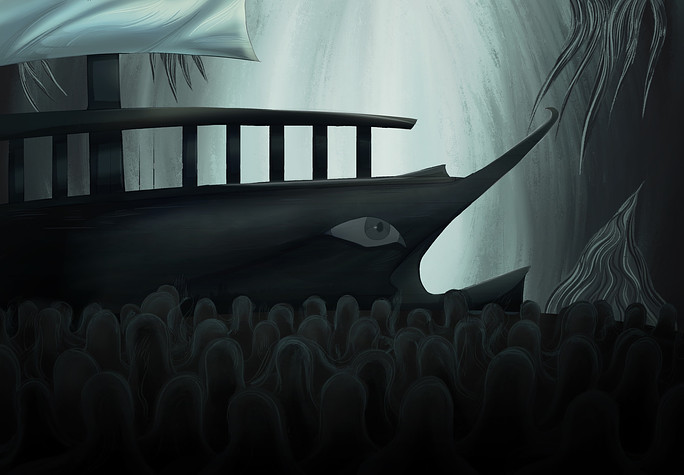
After much desperation, Odysseus finally arrives at where the blind prophet is residing. His name is Tireseas, and despite his expressionless facade, Mason Olshavsky’s voice shows a lot of the emotion that the character lacks. All of the prophet’s lines are given in riddles, much like any of the prophecies that are given in Greek literature, which translate perfectly to a musical medium. However, this duality in the expression isn’t only seen in his voice, but also reflected in the orchestration. In the first section of the chorus, the rhythm is only given with a piano and some light strings, but as its second section rolls in and the tension in the song is at its highest. Many other elements that give a menacing sound are paired, such as the organ and what the composer calls “spiraling strings” (a mixture of piano, strings, and organ in a cyclical sounding manner), using a musical medium to translate what only words cannot explain.
I see a song of past romance
I see the sacrifice of man
I see portrayals of betrayal
And a brother’s final stand
I see you on the brink of death
I see you draw your final breath
I see a man who gets to make it home alive
But it’s no longer
You
Monster is the peak of tension within the first twenty songs, but as the Act One closing number, it also reflects an emotional and mental extreme of Odysseus’s journey. After the hero meets with Tireseas, he is pushed to his edge. The death of his best friend, the passing of his mother without any goodbye, the deaths of 558 men from his crew, and most importantly, knowing that many men are threatening his family’s safety forced him to change. Upon the beginning of the musical, he adopted Polite’s policy of greeting the world with “open arms”, but now, switches his mentality to one of a person who will do anything he has, go through anyone, to get home, reminding of Poseidon’s suggestion that “ruthlessness is mercy upon ourselves.
I must get to see Penelope and Telemachus
So if we must sail through dangerous oceans and beaches
I’ll go where Poseidon won’t reach us
And if I gotta drop another infant from a wall
In an instant so we all don’t die
Then I’ll become the Monster


